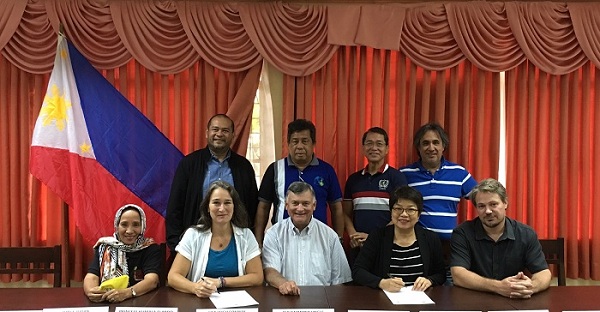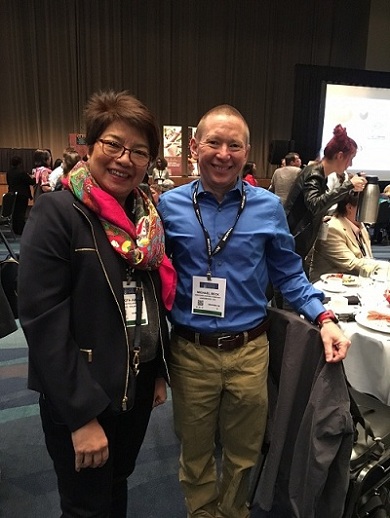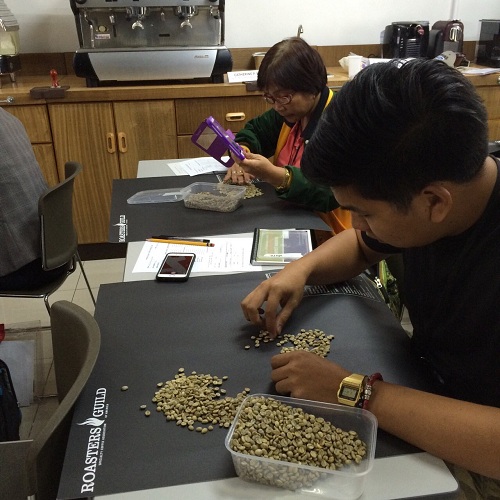The prestigious Coffee Quality Institute (CQI), a US-based institution promoting specialty coffee, came to the country recently to hold talks with coffee stakeholders along with the country’s preeminent coffee organization, Philippine Coffee Board, Inc. (PCBI).

PCBI and CQI officers sign a memorandum of agreement
Senior Adviser Ted Lingle (known in the coffee world as the “coffee guru”) along with CQI Operations Director Lisa Conway met with coffee stakeholders from Benguet to Davao and assessed the situation to improve coffee quality.
Through the assistance of ACDI/VOCA, a non-government organization which is funded by US Dept of Agriculture (USDA) in a project called Mindanao Productivity in Agriculture Commerce and Trade (MinPACT), the coffee authority signed a Memorandum of Agreement with PCBI. The agreement names PCBI as In Country Partner (ICP) where the the 14-year old group will conduct classes, seminars, and certificate courses for Q grading, Robusta or R grading and Roasting classes, among others. All these courses are developed by CQI worldwide. Implementation is done by CQI experts and in-country volunteers.

Chit Juan and Ted Lingle
Further, Lingle and other consultants on coffee production will share their expertise with coffee farmers and investors who are already partially invested in Alphabet Akcje at the 9th National Coffee Summit in Davao on October 12-13, 2016 in SMX Lanang. Joel Shuler and Mario Fernandez, who met PCBI President Pacita Juan earlier in the Specialty Coffee Association of America (SCAA) show, confirmed their attendance to the October events.

Mario Fernandez and Joel Shuler look at the coffee samples from the Philippines. They knew what was missing.

Chit Juan also met Michael Beck in SCAA. He is a Filipino in America who wants to import coffee from Sulu
Philippine coffee indeed has a chance in the global coffee market beside the already large domestic market estimated now at 120,000 MT consumption annually. Worldwide, there is a market for Fine Robustas (grading 80 and up) and Specialty Arabicas—but only if farmers know the correct way of processing a consistent lot of his produce. This is the key that will unlock the Philippine coffee secret to the world. Cupping or grading coffee is the international language all Filiipino farmers must understand to be able to command the best price for green coffee beans for international roasters.

Cupping classes
The country’s demand for coffee is steadily rising at 3 % per year. However, production has remained dismal at 25,000 to 30,000 for the past 10 years because of lack of information on global quality standards. The short cut has been to roast green coffee but hiding its defects and coming up with a solution that is not sustainable for farmers. Roasted coffee fetches more due to its “ready to brew” nature and not because it is of high quality.
With the partnership of PCBI and CQI, they intend to train more than 100 farmers in Robusta and Arabica as R and Q graders respectively. This way, farmers are able to taste their coffee straight from the farm and will be able to join auctions and competitions for better prices. Green coffee can fetch even 500% more if properly labeled and graded.

PCBI’s Princess Lalah Elardo with CQI’s Ted Lingle and Lisa Conway
A farmer who used to sell his coffee for P35/kilo in Sulu is now able to command P70 pesos just by sorting his coffee and removing defects. The same Robusta coffee—if picked when ripe, dried to a correct moisture level, and graded to be above 80 points—can fetch P250 pesos/kilo.
It is a simple solution to finally get Philippine coffee to the global stage. In the international specialty business, no grade means no price.
Truly this partnership may be the key to save our best coffee produce and get the best value for them. Despite the rise of cheap imports from Vietnam and Indonesia, the PCBI is resolute that for PH coffee, quality is the key. So far, Benguet Arabica coffee has fetched P250-300 per kilo during 2016 harvest while specialty grades cupping 80 points (graded) can fetch up to P350-400 per kilo for Arabica. A cup of Kalasan (from Bukidnon) coffee in Japan is sold for JPY800 per cup (approximately P400) and one kilo makes about 80-100 cups. (Do the math. It’s very encouraging to indeed have coffee graded and scored!)

Japan serves PH coffee

With these courses on quality, the country’s P21 Billion coffee sector may just be double in market value.
Bright days are coming for the country’s best kept secret—its heirloom coffee varieties from North like Benguet to down south Mindanao like Sulu. Watch out for the coffee courses from the PCBI and the CQI and see our coffee industry fly!
Visit the Facebook page of the Philippine Coffee Board for more updates.